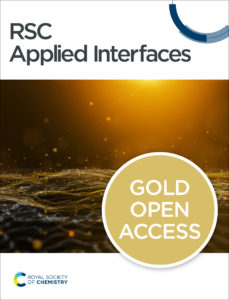
Meet our Early Career Advisory Board members who work on nanomaterials’ interfaces
We announced our inaugural Advisory Board for RSC Applied Interfaces in early September. In this series of blog posts, we will be shining a spotlight our new Early Career Advisory Board members and introducing them to you!
This week we are delighted to introduce Riccardo Marin and Ye-Tang Pan as members of our inaugural Early Career Advisory Board.
 Riccardo Marin, Ca’ Foscari University of Venice
Riccardo Marin, Ca’ Foscari University of Venice
ORCID: 0000-0003-3270-892X
Riccardo Marin obtained his Ph.D. in chemistry from University Ca’ Foscari (Italy) and Institut National de la Recherche Scientifique (Canada) with Prof. Patrizia Canton and Prof. Fiorenzo Vetrone. After a postdoctoral fellowship at the University of Ottawa with Prof. Eva Hemmer and Prof. Muralee Murugesu, he moved as a Marie Skłodowska-Curie fellow first and then Ramón y Cajal fellow to the Universidad Autónoma de Madrid in the group of Prof. Daniel Jaque (nanoBIG). Since 2025, he is Associate Professor at University Ca’ Foscari of Venice, where he co-leads the Intelligent Optical Nanomaterials (IONs) group. His research interests include optical (nano)materials for sensing and biomedical applications, and coordination compounds with optomagnetic properties.
“I am thrilled to be joining the RSC Applied Interfaces team as an Early Career Advisory Board member! I look forward to this opportunity of contributing to the growth of the journal.”

Ye-Tang Pan, Beijing Institute of Technology
ORCID: 0000-0002-2850-5129
Ye-Tang Pan received his Ph. D. degree (2018) in Materials Science and Engineering from Universidad Politécnica de Madrid under the supervision of Prof. Dr. De-Yi Wang (EurASc FRSC MEASA). Following postdoctoral research and an assistant professorship, he has been an associate professor at National Engineering Research Center of Flame Retardant Materials, Beijing Institute of Technology since 2022.
His research is primarily concerned with the design of functional nanomaterials, flame retardant polymer nanocomposites, microwave absorption materials and functional coatings.
“I’m thrilled to embark on this journey with the journal RSC Applied Interfaces. It promises to be a dynamic platform where innovative research meets practical applications, and I look forward to contributing to and learning from the vibrant community of scientists and researchers who are shaping the future of materials and interfaces.”
Please join us in welcoming our new Early Career Advisory Board members to the journal community! See our full line-up of Early Career Advisory Board members here.
Comments Off on Introducing Riccardo Marin and Ye-Tang Pan to our Early Career Advisory Board








 RSC Applied Interfaces
RSC Applied Interfaces



 Riccardo Marin, Ca’ Foscari University of Venice
Riccardo Marin, Ca’ Foscari University of Venice